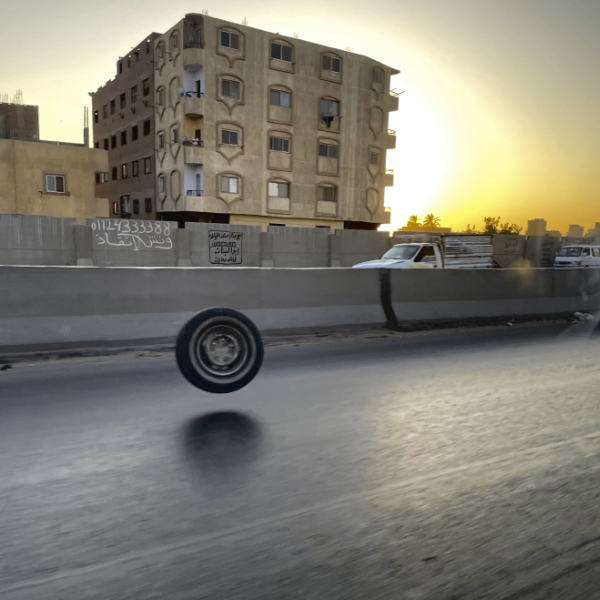Post

Wheels falling off
In early August, I traveled to Egypt with colleague Carmelo Troccoli to investigate the potential for new farmers markets in the very place that developed so much of what we know today in agriculture: crop varieties, wheat, irrigation, for starters. Modern Egypt is a dynamic and complicated place.
The ride from Cairo up to the coast was mesmerizing. The eight lane highway is smooth and well maintained. However, it is also a circus. The cars weave and bob between lanes with such casual abandon that it is actually quite beautiful to witness. This would be fine, if it were not for the simultaneous flow of pedestrians who saunter across the road. In a word, it was terrifying. The elevated expressways have few off-ramps. Instead, pedestrians congregate at the side of the road, hopping in and out of jitneys and taxis, only to climb down stairs into semi-formal neighborhoods that line the roads.
It was on this drive that I somehow captured this image of a wheel bouncing down the highway. Our driver did a fine job avoiding it. We watched the wheel come off a heavily-laden pickup truck two or three car lengths ahead of us. Sparks flew, the wheel popped into the air, and the truck kept on going. It bounced a bit, but it kept on going.
This incident stayed with me as the evening drew on. The road follows the path of the Nile from Cairo to the Mediterranean. Satellite images reveal how this part of Egypt resembles a lotus flower and stem. Check it out online. It really does! Why is this so? The Nile nourishes the land to produce incredibly productive agriculture. From the sky, the lotus flower and stem is a dark green that stands out against the sandy desert that makes up much of Egypt.
Here’s the tragedy. The massive demand for housing in Cairo is turning much of the stem of the flower into an endless parade of thrown together highrises. One cluster after the other gobbles up productive farmland. Agriculture is still big business. The roads are packed with lorries bringing fresh crops to Cairo. However, with each highrise you pass, you get that sinking feeling. Neoliberal modernization and the maddening desire to run to the city for opportunities has weakened Egyptian agriculture and a nation that once took pride in agricultural self-reliance.
Like the truck whose wheel popped off in the road at 70 mph, the Egyptian model for development combines simultaneous construction and collapse (in equal portions). In this regard, Egypt is a metaphor for the world. We are barreling down the road with careless abandon, losing wheels faster than we can replace them. And worse, we hardly seem to notice.
While this metaphor may be cause for distress, the rest of the trip provided fuel for optimism. As is the case in many places, there are good people who work in both public and private sectors who recognize that we must change. Pressures are real: demographic pressures, rapid urbanization, the inflow of refugees, and the inflation that eats into any progress made by aspiring families and classes.
Our project is to harness the pride in local food, cultivate the leadership to coalesce urban consumers together with rural farmers and nearby fishers beneath the canopy of commerce. The souk, bazaar, etc. are very familiar and old ideas. However, this new project is to update it with professional management, through transparency and trust. Through this is discrete strategy, it is part of larger efforts to recalibrate local food for local people. Maybe just maybe, we can begin to bend the road towards local self-reliance, slow down the pace of everyday life, and provide experiences that deliver dignity and mitigate risks for eaters and farmers alike. After all, the endless caravan of small boats to cross the Mediterranean will continue, unless we can begin to invest in the quality of life in otherwise desperate and chaotic places. Is this a policy lesson that will stick? Will we learn similar lessons in North America or have we grown comfortable with the model of desperate migrants keeping the wheels of agriculture moving?
If we fail, the wheel is the image of our future.
